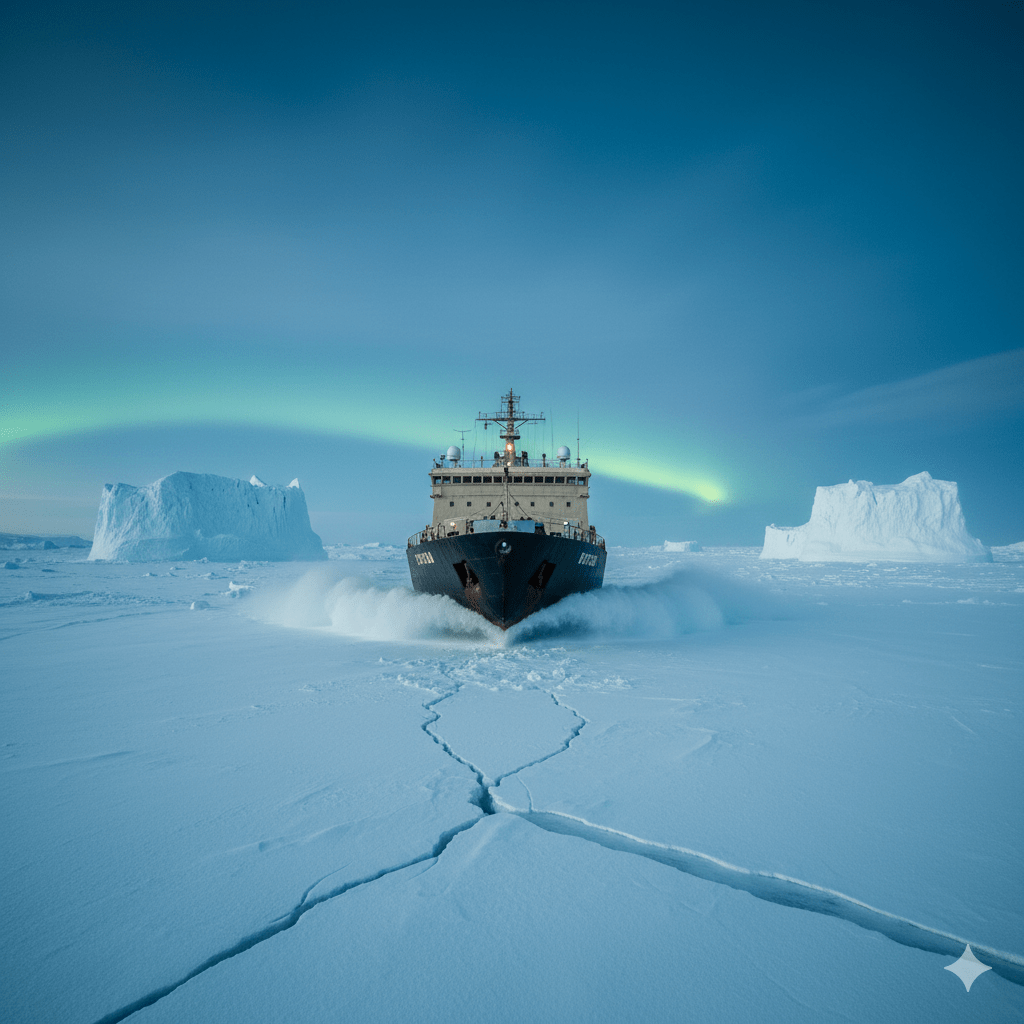The basic training for ships operating in polar waters
- Format: online on interactive platform
- Duration: 3 days
- Language: Ukrainian, Russian, English

The course “Basic Training for Ships Operating in Polar Waters” is designed for captains, shipmasters and officers
serving on board vessels operating in polar waters and engaged in planning and conducting voyages in ice conditions.
The programme has been developed in accordance with the International Convention on Standards of Training,
Certification and Watchkeeping for Seafarers (STCW Convention) – Regulations I/12 and V/4, Sections A‑I/12, A‑V/4,
B‑I/12, B‑V/4 and Table A‑V/4‑1 of the STCW Code, as well as SOLAS 74 as amended, MARPOL 73/78 and the
recommendations of IMO Model Course 7.11 “Basic Training for Ships Operating in Polar Waters”.
The course consists of 10 modules and covers ice navigation, vessel performance in low temperatures, safe operations,
environmental protection and emergency response in polar regions. Training is delivered fully online through video
lessons, additional learning materials and documents that can be accessed from a computer, smartphone or tablet.
After completing all modules, participants sit a final test and, if successful, receive a certificate of completion.
Upon successful completion of the course, participants will be able to:
- contribute to the safe operation of vessels navigating in polar waters
- understand ice characteristics and the areas where different types of ice can be expected
- assess vessel performance in ice and at low air temperatures
- plan and conduct safe ship manoeuvring and operations in ice conditions
- monitor and ensure compliance with applicable international and national regulations in polar waters
- apply safe working practices on board and organise the crew’s response to emergencies
- ensure proper crew preparation, working conditions and safety measures for polar operations
- comply with pollution prevention requirements and minimise environmental risks in sensitive polar ecosystems
- use acquired manoeuvring skills to operate ships safely in ice and severe weather conditions
To obtain the certificate, participants must complete all 10 course modules and successfully pass the final test,
confirming that they meet the basic training requirements for service on ships operating in polar waters.
Upon successful completion of the training, participants are awarded the certificate
“Basic Training for Ships Operating in Polar Waters”, confirming their readiness to contribute to the safe operation
of ships in polar regions in accordance with international conventions and national regulations.
Course Reviews
Excellent English course! Perfect pronunciation training and maritime terminology. Highly recommend for all seafarers.
Great interactive lessons. The technical English section was particularly useful for engine room communications.
Good course structure and materials. Would love to see more practice with radio communications.
Perfect for beginners! Clear explanations and plenty of practice exercises. My confidence improved significantly.
How it works:
1. Choose us
We have been in the market for over 20 years. Our courses are certified and recognized worldwide.
2. Register
Complete online registration to save time. Choose a course and after registration and payment, you will get access to training without extra steps.
3. Complete the course
Training is available from any device: PC, laptop, tablet or smartphone (iOS/Android). You can choose online format or download materials.
4. Evaluate knowledge
Assessment is conducted in the form of a test with multiple choice questions. After successful completion of testing, you will receive a certificate.
5. Get certificate
You will be provided with a link to download the certificate. The certificate can be printed at any time. If desired, the original printed copy can be ordered by mail.
How it works:
1. Choose us
We have been in the market for over 20 years. Our courses are certified and recognized worldwide.
2. Register
Complete online registration to save time. Choose a course and after registration and payment, you will get access to training without extra steps.
3. Complete the course
Training is available from any device: PC, laptop, tablet or smartphone (iOS/Android). You can choose online format or download materials.
4. Evaluate knowledge
Assessment is conducted in the form of a test with multiple choice questions. After successful completion of testing, you will receive a certificate.
5. Get certificate
You will be provided with a link to download the certificate. The certificate can be printed at any time. If desired, the original printed copy can be ordered by mail.
Frequently Asked Questions
This course is mandatory for all seafarers, officers and ratings working on board a vessel, in accordance with STCW A-VI/6, p. 1.
To enroll in the course, you need a valid medical certificate and a valid seaman's passport.
After completion, you will know different security levels, emergency procedures, and be able to recognize and avoid threats.
The course covers information about different security levels, emergency procedures, threat recognition and avoidance methods. You will learn about ship security, port facility security, and relevant international regulations.
Yes, the course is fully online and can be completed remotely. You can access the materials at any time convenient for you, from any device with internet access.
Upon successful completion of the course, you will receive an internationally recognized certificate that complies with STCW requirements. The certificate will be available for download immediately after passing the final test.
Yes, the certificate is fully compliant with the International STCW Convention 78 (as amended) and is recognized by maritime administrations of Panama, Liberia, Marshall Islands, and the USA.
Yes, you can take the course from any country as long as you have a stable internet connection. Our platform is accessible worldwide, 24/7.
The course duration is flexible and depends on your learning pace. On average, it takes 2-3 days to complete all materials and pass the final test.
The course cost is competitive and includes all materials, tests, and certification. Please contact our managers for current pricing and available discounts.
The course is available in multiple languages including English, Ukrainian, and Russian. You can choose your preferred language when enrolling.
